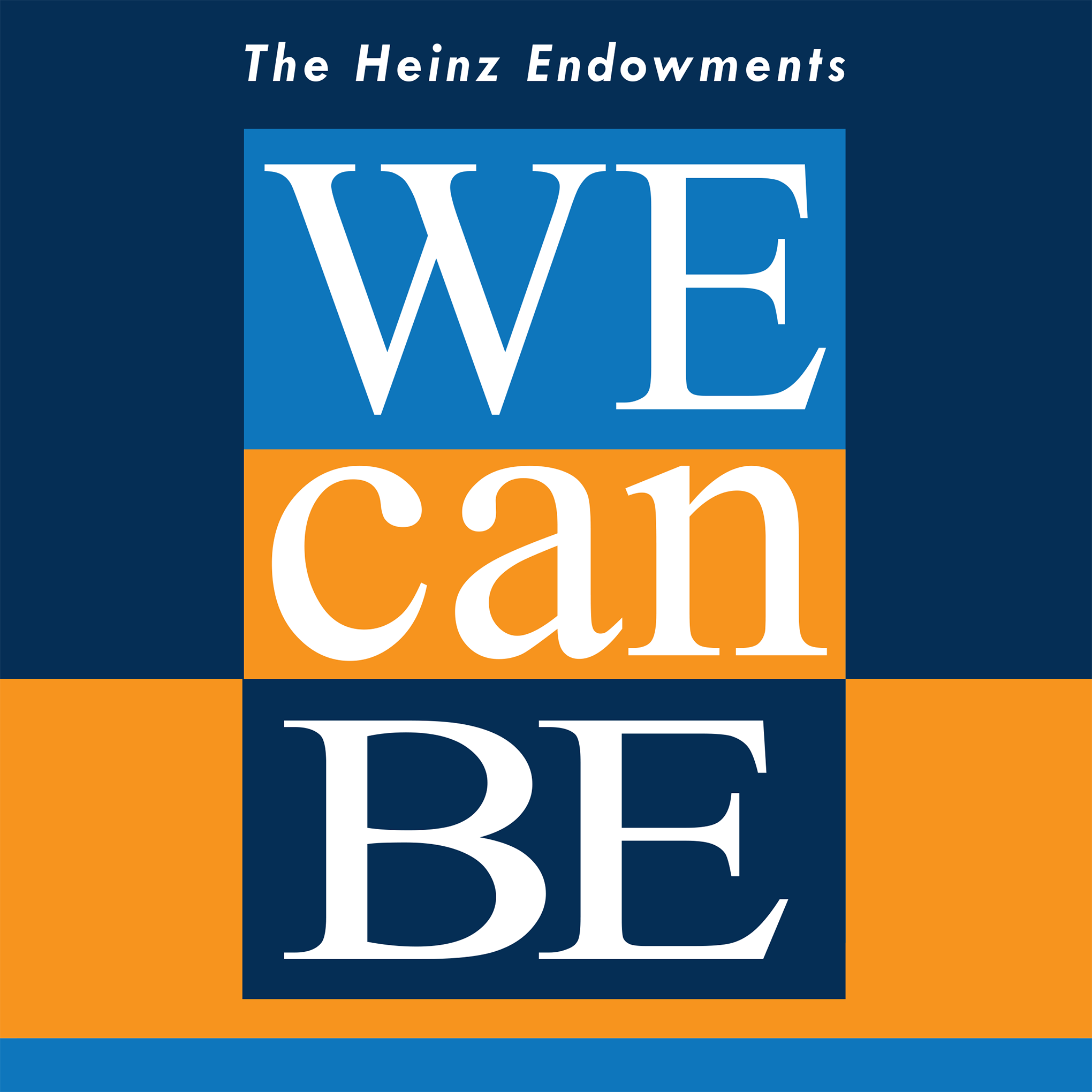Episodes
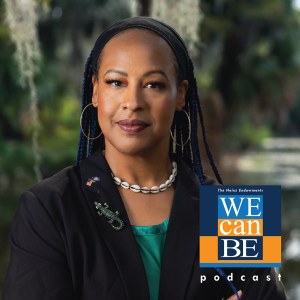
Wednesday Oct 16, 2024
Wednesday Oct 16, 2024
Colette Pichon Battle, Heinz Award for the Environment honoree and the vision and initiatives partner for the climate justice nonprofit Taproot Earth joins host Chris DeCardy. Colette was inspired to shift her career from corporate law to environmental activism after her family’s experience in the aftermath of Hurricane Katrina nearly two decades ago.
As the United States begins recovery from the historic devastation of Hurricanes Helene and Milton and faces increasingly serious effects of climate change, her leadership is helping address the urgent need for knowledgeable insight and direction.
“It is an emotional moment because you know that people are not going to pay attention to this issue in a deep and real way until you're hit by it,” Colette tells host and Endowments President Chris DeCardy. “But it is also a moment where I am reassured that the work that I've committed my life to is the right work.”
Born and raised in a close-knit family in the Bayou Liberty region of coastal Louisiana, Colette spent time in Ohio at Kenyon College and West Africa after earning her law degree from Southern University Law Center.
After settling into her dream life as a lawyer in New York City, she was drawn back to Louisiana to find and assist family when Katrina struck the southern coastal region in 2005.
She founded the Gulf Coast Center for Law & Policy to help Gulf South communities of color in in Texas, Louisiana, Mississippi, Alabama and Florida. In 2022, the organization transitioned into Taproot Earth, widening its scope to include BIPOC communities worldwide that are withstanding the worst of climate change.
“I think the problem at the root cause of the climate crisis is capitalism and an unjust economic system,” Colette says. “We have a value system that is rooted in extraction, and I think that's wrong. I think we should value creation. I think we should value love. I think we should have a different values system.”
Colette and her Taproot Earth team are uplifting those different – and better – values, community by community in the United States and around the world.
“We Can Be” is hosted by Heinz Endowments President Chris DeCardy, & produced by the Endowments, Josh Franzos & Tim Murray. This episode presentation is a partnership between The Heinz Endowments & the Heinz Family Foundation. Theme music by Josh Slifkin. Guest & host photos: Josh Franzos. Guest inquiries: Scott Roller at sroller@heinz.org.
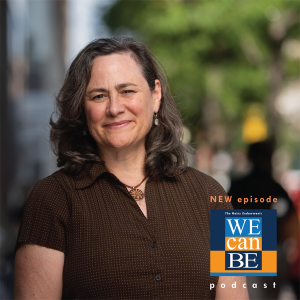
Wednesday Oct 09, 2024
Wednesday Oct 09, 2024
Sharon Pillar, Pennsylvania Solar Center founder and executive director, is continuing the solar energy advocacy started nearly a half-century ago by former President Jimmy Carter, who recently marked his 100th birthday.
“It’s a lot different now than it was when President Carter put those solar panels on the West Wing roof,” Sharon tells host and Endowments President Chris DeCardy. "We are really seeing this proliferation and adoption of solar energy just taking off. And now with the Inflation Reduction Act, it's become an even bigger and undeniable game changer.”
From that first White House solar array in 1979 to the $90 billion in clean energy investment that came in the first six months of the 2022 IRA, a new generation of advocates is working tirelessly to bring the health, financial and workforce development benefits of solar energy to light.
Sharon has led solar and climate change programs at both PennFuture, a nonprofit that advocates for the clean energy economy, and the Solar Unified Network of Western Pennsylvania. She trained with Nobel Peace Prize winner and former Vice President Al Gore’s Climate Reality Project. She also is a nationally respected and trusted solar consultant who has helped organizations and municipalities seeking to finance and install solar projects.
She talks with Chris about the massive workforce potential the solar sector could see in the next decade and the challenges some communities face in advancing solar. In addition, she describes the eye-opening savings of $19 million over 25 years that a 2024 Pennsylvania Solar Center study found residents of two southwestern Pennsylvania cities could save if they embrace solar energy.
Sharon has clearly found her calling to, as Pennsylvania Solar Center says on its website, “help put solar everywhere under the sun.”
“We Can Be” is hosted by Heinz Endowments President Chris DeCardy, and produced by the Endowments, Josh Franzos and Tim Murray. Theme music by Josh Slifkin. Guest photo: Tim Murray; host photo: Josh Franzos. Guest inquiries may be made to Scott Roller at sroller@heinz.org.
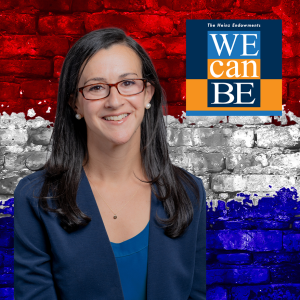
Wednesday Oct 02, 2024
Wednesday Oct 02, 2024
VoteRiders CEO and Executive Director Lauren Kunis is clear about what is at stake when it comes to those who are using false claims of voter fraud as the basis for enacting overly stringent voter ID laws. The laws affect 35 million voting-age citizens – a majority of whom are first-time voters, low-income residents, people of color and/or differently abled.
“Those who are already underrepresented in our electorate are most harmed and most disproportionately impacted by voter ID laws,” Lauren tells “We Can Be” host and Endowments President Chris DeCardy. “These laws are undermining our shared democracy and impacting all voters, not just ones from certain states or specific communities.”
Santa Monica, California-based VoteRiders is a non-partisan, nonprofit organization with a mission to ensure that all citizens can exercise their freedom to vote, with team members or partner organizations in 44 states and more than 10,000 volunteers across the country.
A fair, accessible voting experience is critical for the more than 162 million people expected to participate in the fall 2024 election. VoteRiders – whose names honors the civil rights-era Freedom Riders – focuses its efforts not only on civic engagement and voter ID laws, but also touches on economic, social and racial equity for the thousands it helps navigate the voter ID system every day.
“That ID helps them vote, but it's also a way for them to open a bank account for the first time or get a job in the formal sector or get more stable housing for their family,” Lauren says.
Prior to taking the helm at VoteRiders, Lauren’s leadership experience included work on international democracy and governance programs while with the World Bank and time as national program director at Nonprofit Vote, where she led her team to a record-setting number of voter registrations on voter registration day in 2020.
With nearly 40 states now requiring steps beyond simply registering to vote, some states rejecting student IDs as acceptable for voting, and the promise of false claims about election fraud, VoterRiders is leading the charge for lessening voter suppression and strengthening our democracy.
“We Can Be” is hosted by Heinz Endowments President Chris DeCardy, and produced by the Endowments, Josh Franzos and Tim Murray. Theme music by Josh Slifkin. Host photo by Josh Franzos; guest photo courtesy of Lauren Kunis/VoteRiders. Guest inquiries may be made to Scott Roller at sroller@heinz.org.
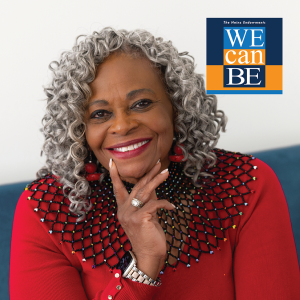
Wednesday Sep 25, 2024
Wednesday Sep 25, 2024
Dr. Margaret Larkins-Pettigrew, Allegheny Health Network’s first chief clinical diversity, equity and inclusion officer, wrote in a widely shared 2023 op-ed: “It is perilous to be Black and pregnant in America. We need to do better.”
The nationally respected expert in maternal and infant health equity is not afraid to speak out against health injustice or to amplify the startling differences between Black and white mothers and babies’ health outcomes – while helping forge a better way.
Dr. Larkins-Pettigrew’s expertise is especially critical in a nation where the number of Black babies who die within one year of birth is three times higher than the death rate of white babies. In Pittsburgh, where Allegheny Health Network is based, female Black infant mortality is higher than in 70% of similar-sized cities.
“When we do things that intervene and decrease those higher numbers for Black women, then we also decrease mortality rates for white women, so everyone wins,” Dr. Pettigrew tells “We Can Be” host and Endowments President Chris DeCardy. “Everything we do for one is going to affect everybody and give opportunities to all.”
With key leadership and teaching positions at University Hospitals of Cleveland, Case Western Reserve University and Drexel University College of Medicine, Dr Pettigrew has been building a coalition of medical and social work professionals through the groundbreaking First Steps and Beyond initiative.
The Endowments-supported First Steps and Beyond program centers a unified care strategy that addresses both medical and social needs through an equity and justice-centered approach to care for mothers and babies. And it works, with data from a five-year study in the Cleveland metro region where the program was implemented showing a 20% decrease in maternal and infant mortality in the first year after birth.
Whether appearing on MSNBC, NBC news and PBS, writing “The Colors of My Heart: Embracing My Blackness with History, Family, Fear and Faith,” or founding medical collaboration nonprofit JUSTWONDOOR, Dr. Larkins-Pettigrew, also a U.S. Navy veteran, and her collaborators are leveling the maternal and infant health playing field – and saving lives.
“We Can Be” is hosted by Heinz Endowments President Chris DeCardy, and produced by the Endowments, Josh Franzos and Tim Murray. Theme music by Josh Slifkin. Guest and host photos by Josh Franzos. Guest inquiries may be made to Scott Roller at sroller@heinz.org.
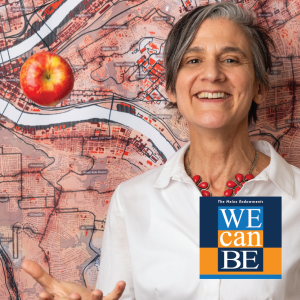
Wednesday Sep 18, 2024
Wednesday Sep 18, 2024
Jen Flanagan is founder and executive director of Community Kitchen Pittsburgh, an employment-based social enterprise that empowers people through food service training and life skills mentoring. With an impressive 93% placement rate in professional kitchens for those who complete their training programs, she and her team are giving brighter futures to hundreds who find themselves struggling to overcome systemic barriers at the margins of society.
After witnessing the 2001 attack on the World Trade Center’s Twin Towers in NYC from her publishing company office window, Jen felt a change inside. "After 9/11, I decided I wanted to do something more with community service," she said. "I just wanted to change my trajectory."
When an AmeriCorps VISTA program placement brought her to Pittsburgh, she soon realized the intersection of two of the most persistent issues our country is facing – food insecurity and access to living wage jobs – provided enormous potential to do good.
She launched Community Kitchen Pittsburgh – an affiliate of Catalyst Kitchens, a national system of non-profit teaching kitchens – in 2013 with an aim of addressing both the need for training and judgment-free life skills guidance.
“For us, you can’t separate joblessness and hunger. They go hand in hand,” she tells host Chris DeCardy, president of The Heinz Endowments. “We work with employers that pay good wages, provide benefits and treat our people well.”
The organization’s wholistic approach is working. It prepares and serves 450,00 meals each year for those experiencing food insecurity, and formerly incarcerated individuals who complete their free-of-charge,12-week training program have a recidivism rate of just 5% – a full 15% lower than the national average.
With an estimated 13% of individuals nationwide – and 21% in the Pittsburgh region - experiencing food insecurity, Jen and her team’s successes at the intersection of hunger and workforce development are a welcome stream of light.
“We Can Be” is hosted by Heinz Endowments President Chris DeCardy, and produced by the Endowments, Josh Franzos and Tim Murray. Theme music by Josh Slifkin. Guest inquiries may be made to Scott Roller at sroller@heinz.org
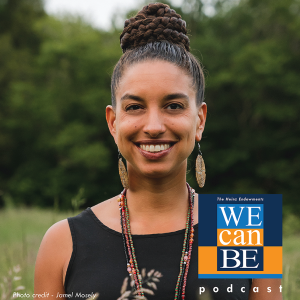
Wednesday Sep 11, 2024
Wednesday Sep 11, 2024
Leah Penniman, “Farming While Black” author, co-founder of Soul Fire Farm and Heinz Award for the Economy honoree has a deep commitment to sharing regenerative farming best practices and land stewardship with Black, Indigenous and people of color. Addressing racism and injustice in the food system is a central focus of her work.
“When I was a young farmer growing up in the mid-90s and attending agricultural conferences and trainings,” Leah tells host Chris DeCardy, “it was very rare to see someone who looked like me or reflected my heritage, especially among leaders and experts.”
Based in Petersburgh, NY, Soul Fire Farm started as an 80-acre family farm and has since blossomed into a nonprofit training center for Black and brown people to reconnect with the land and equip them with the skills needed to become leaders in the farming and food justice movement.
Whether in her books – “Black Earth Wisdom: Soulful Conversations with Black Environmentalists” and “Farming While Black: Soul Fire Farm’s Practical Guide to Liberation on the Land” – or leading youth education programs, urban plantings, mobilization training and a community-supported agriculture program, Leah and her Soul Fire Farm colleagues are inspiring a new generation of young farmers.
“Stewarding our own land, growing our own food, educating our own youth, participating in our own healthcare and justice systems - this is the source of real power and dignity,” Leah says in this episode, presented in partnership with the Heinz Family Foundation.
From the recent well-received “Farming While Black” documentary film to working behind the scenes with Sen. Cory Booker in creation of his Justice for Black Farmers Act, Leah is bringing the long history of Black and brown farmers’ sustainable farming practices into the future.
“We Can Be” is hosted by Heinz Endowments President Chris DeCardy, and produced by the Endowments, Josh Franzos and Tim Murray. Theme music by Josh Slifkin. This episode presentation is a partnership between The Heinz Endowments and Heinz Family Foundation. Guest inquiries may be made to Scott Roller at sroller@heinz.org.
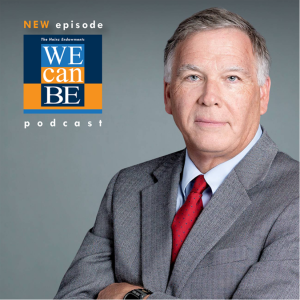
Wednesday Sep 04, 2024
Wednesday Sep 04, 2024
Dr. George Thurston, internationally respected scientist, professor and pioneer in the study and communication of the effects of air pollution’s impact on human health joins the “We Can Be” family.
”Science is a way to bridge a lot of our societal division and distrust,” he tells Chris DeCardy, Heinz Endowments president and “We Can Be” host. “People trust science, and we have a responsibility to speak out when we can help.”
In 1987, Dr. Thurston published the first research that showed the association between fine particulate matter and human mortality. He was also a brave voice that spoke up in the aftermath of the 9/11 catastrophe in New York City when statements by municipal officials about air safety did not match the results of research that he and his team were undertaking.
More recently, Dr. Thurston led a groundbreaking, Endowments-funded study focusing on the myriad of health benefits Pittsburgh-region communities experienced after the closing of the Shenango Coke Works on Neville Island. The study has garnered international attention.
He is a professor in the departments of environmental medicine and population health at the New York University Grossman School of Medicine, as well an expert at communicating the scientific complexities of environmental challenges in ways that are more easily understood.
Whether testifying before Congress about the human health improvements that go hand-in-hand with climate change mitigation, or being featured in The New York Times, The Guardian, U.S. News & World Report and on major television news networks, Dr. Thurston is a warrior for cleaner air.
Dive into the fascinating, brilliant and inspiring career of Dr. George Thurston in this episode of “We Can Be.”
“We Can Be” is hosted by Heinz Endowments President Chris DeCardy, and produced by the Endowments & Treehouse Media's Josh Franzos and Tim Murray. Theme music by Josh Slifkin. Guest inquiries: Scott Roller at sroller@heinz.org.
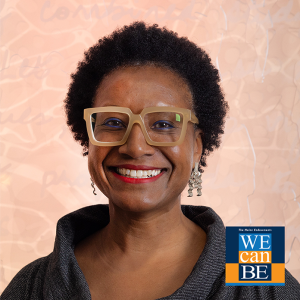
Wednesday Aug 14, 2024
Wednesday Aug 14, 2024
Kilolo Luckett, nationally renowned art curator & founding executive director of ALMA | LEWIS, believes in the transformative power of art for both artist & audience.
“When we genuinely connect with art, we can dream whole other worlds of possibility,” she tells Heinz Endowments President Chris DeCardy, who takes the wheel as our podcast’s host on the first episode of this new season of “We Can Be.” “
With nearly 25 years of experience at respected art spaces including The Andy Warhol Museum & Wood Street Gallery, Kilolo founded ALMA | LEWIS as an experimental, contemporary art platform for critical thinking, constructive dialogue & creative expression dedicated to Black culture.
Featuring residencies designed to nurture rising & accomplished Black artists from around the world, Alma I Lewis is named after early 20th-century painter Alma Thomas, who has been cited as a “godmother of abstract painting,” & painter Norman Lewis, the winner of the top art prize at the 1955 Carnegie International.
Born in Mississippi, Kilolo’s artistic journey seemed destined from the start. From selling her friends’ art at the lemonade stand in her neighborhood when she was a kid growing up in Bowling Green, Ohio to becoming one of the creative sector’s most respected writers, historians & curators, her path was meant to be.
“From an early age, I just knew that people needed art in their lives,” she says.
Kilolo’s conversation with Chris dives into both the joys & challenges of overcoming the inequities of underrepresented voices in contemporary art.
From curating expositions & writing exhibition books for galleries & museums around the country to working on an upcoming authorized biography of the first Black supermodel, Naomi Simms, Kilolo is helping ensure that the beauty, depth & vision of Black artists and cultural luminaries are a celebrated part of our history.
“We Can Be” is hosted by Heinz Endowments President Chris DeCardy, and produced by the Endowments, Josh Franzos and Tim Murray. Theme music by Josh Slifkin. Guest inquiries may be made to Scott Roller at sroller@heinz.org.
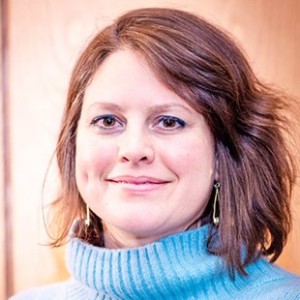
Wednesday Sep 28, 2022
Wednesday Sep 28, 2022
Ohio River Valley Institute Executive Director Joanne Kilgour joins host Philip Johnson, the Endowments’ senior program director for Environment & Health, in breaking down the hype around hydrogen hubs and carbon capture.
Hydrogen hubs have as their centerpiece massive pipeline networks that funnel carbon captured from power plants and factories to injection points for underground sequestration. Some present the process as key to our environmental future, but are the promises of jobs and a reduction in global warming real?
Ohio River Valley Institute (ORVI) was founded in 2020 with an aim of providing data-driven environmental research that advances a more prosperous, sustainable and equitable Appalachia. The organization has become a leading voice in researching and communicating what carbon capture and hydrogen hubs would really mean for our country's future.
“Our research shows that not only are hydrogen hubs likely to be costly, taking funding away from more sustainable, long-term solutions,” Joanne says, “but they are also unlikely to deliver on significant job creation or to be an effective climate solution.”
Joanne grew up in Maine, earned degrees at Carnegie Mellon University and University of Pittsburgh, and has held positions with the Center for Coalfield Justice and the Sierra Club. An avid nature advocate, she holds a doctorate in environmental law, and the opportunity to “reveal surprising realities” about Appalachia’s energy future led her to ORVI.
She shares what she has seen about the unwavering sense of pride and place that Appalachians possess; what she has learned about the power of combining data and lived experience in revealing truths; and why she takes care to humanize policy research decisions by keeping the on-the-ground individuals she meets in Appalachian communities front of mind.
“I believe we can be compassionate problem solvers,” Joanne says. Learn how she is doing just that in this episode of “We Can Be.”
This episode of “We Can Be” is hosted by Heinz Endowments Senior Program Director for Environment & Health Philip Johnson and produced by the Endowments, Josh Franzos and Tim Murray. Theme music by Josh Slifkin. Guest inquiries can be made to Scott Roller at sroller@heinz.org. Guest image credit: PA Dept. of Conservation and Natural Resources.
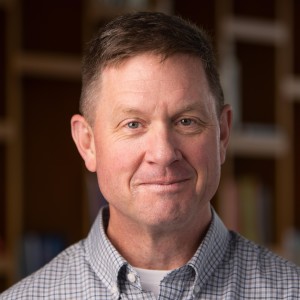
Wednesday Sep 21, 2022
Wednesday Sep 21, 2022
Dr. Daniel Perkins, professor, founder and principal scientist of the Clearinghouse for Military Family Readiness at Penn State University, leads the largest-ever longitudinal study of post-911 transitioning veterans, “The Veteran Metrics Initiative.”
Danny joins host Megan Andros, the Endowments’ senior program officer for veterans, in diving into the startling findings of his team’s research. Beginning with an initial cohort of 10,000 veterans, the study followed an eventual 6,700 veterans over a three-year period as they transitioned from active military duty to civilian life.
The resulting data has revealed hard truths about the bureaucratic, financial, health and vocational obstacles veterans often face, and provides a basis for asking: Are we failing our veterans at the moment they need us most?
Despite the enormous leadership skills, technical ability, and work ethic veterans bring to our world, the study found that only 34 percent of post-9/11 veterans were deemed successful in transitioning from military to civilian life at the two-and-a-half-year mark.
The research makes clear that while a wealth of organizations provide services to those exiting the military, the navigation of those services can be dauntingly difficult for veterans.
“Transition is a place where things can go wrong, or it can be a place of great opportunity,” Danny says. “This data helps us understand that by taking action early on, we can help our veterans have better outcomes in the civilian world.”
Danny shares how growing up as a son of a military father influenced his dedication to his veterans research; why focusing on coordinated points of contact for service providers is key; and why it is important to remember that behind each data point is a human being who has served our country.
“I think as a country we can be a place where we acknowledge veterans for their service by taking action to support them when they need us most.”
This episode of “We Can Be” is hosted by Heinz Endowments Senior Program Officer for Veterans Megan Andros and produced by the Endowments, Josh Franzos and Tim Murray. Theme music by Josh Slifkin. Guest inquiries can be made to Scott Roller at sroller@heinz.org. Guest image credit: Tim Murray/Treehouse Media.

